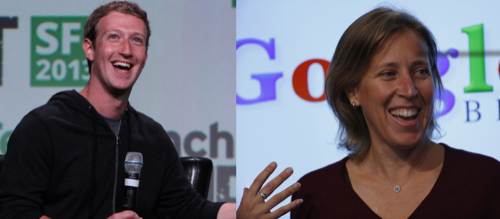
Today Google announced Shared Endorsements, a feature that will display your name and image next to advertisements. It’s an ad play that sounds suspiciously like Facebook’s Sponsored Stories, which similarly placed Facebook users (and their mugs) into online ads.
But Google has clearly learned from Facebook’s fumbles surrounding ads, and is entering the realm of personalized, targeted ads with a little more transparency.
Sponsored Stories drew an outcry from Facebook users, a class-action lawsuit and an eventual $20 million settlement that forced the company to restructure its privacy policies and call the sponsored stories what they are—ads. The 2011 lawsuit against the company claimed that Facebook violated users’ privacy rights by publicizing user Likes in advertisements without permission or compensation.
When the social network originally implemented Sponsored Stories, users couldn’t opt out of the service, effectively turning all Likes into advertising fodder. Google, however, has avoided that pitfall. Users can limit the visibility of posts or +1s outside of ads by deleting them or changing settings to restrict who can see them. We had reported previously that this was an opt in feature, but some commenters noted their accounts already had the Shared Endorsements feature enabled. However, Google prompted me to opt in to the feature when I accessed the Shared Endorsements link; it wasn’t already enabled.
Google has confirmed the advertising feature is an update to a new setting, +1 Personalization, that lets users decide whether or not they want their +1s shared across Google. So if you originally opted out of sharing your +1s across Google, you will have to opt in to the Shared Endorsements feature. If you don’t want any of your activity from Google Plus, the Play Store or YouTube used in advertisements, make sure to double check your privacy settings to opt out of these features.
These steps are certainly laudable from a user privacy perspective—even if they’re also a pretty clear attempt to avoid Facebook-like user rage.
Shared Endorsements enables advertisers to show user names, photos and comments made about their products or services on Google’s sites, including Google Plus (Google’s own social network) and YouTube.

While the personalized advertising recommendations from Facebook and Google sound eerily similar, Facebook is actually more upfront about how and why it uses information:
Sponsored stories are messages coming from friends about them engaging with a Page, app or event that a business, organization or individual has paid to highlight so there’s a better chance people see them.
Google, by contrast, is a little more vague:
When it comes to shared endorsements in ads, you can choose whether your name and photo may be used to help your friends find stuff you love (and avoid stuff you don’t).
Head to Google’s home page today and you’ll see a bright blue banner indicating the company’s new terms of service and advertising structure. Last year, Google bombarded its users with notifications of its last major privacy-policy change in much the same way; it’s a handy technique for diverting user backlash by making the policy updates impossible to avoid.
Google’s Shared Endorsements program is an addition to the company’s updated Terms of Service that goes live on November 11.
Mark Zuckerberg photo by Madeleine Weiss for ReadWrite; Susan Wojcicki image courtesy of Reuters/Stephen Lam
















